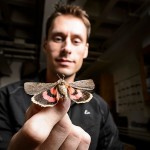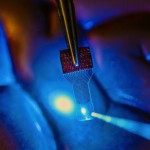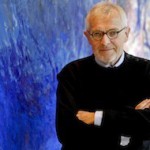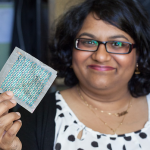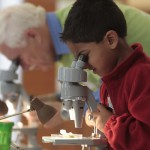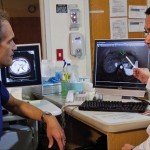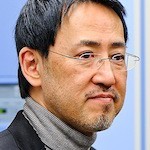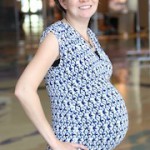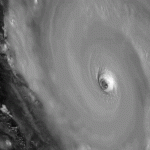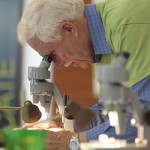Category Science & Technology
Wisconsin’s new ‘bug guy,’ insect detective arrives on campus
His favorite insect is one he has actually never seen alive in the wild. It lives on snowfields and glaciers in the American West, aptly named an ice crawler. But PJ Liesch, the University of Wisconsin–Madison’s new “bug guy,” continues to search for it. “I’ve been out West looking for them a couple of times and haven’t had any luck, so they’re kind of one I have on my bucket list, just to see one of those out in the wild,” says Liesch. The insect specialist officially took over as manager of the UW–Madison Insect Diagnostic Lab this summer.
UW to serve as national hub for mentor training as part of diversity consortium
The University of Wisconsin–Madison will serve as a national hub for research mentor and mentee training for the National Research Mentoring Network (NRMN) recently announced by NIH as part of a national Diversity Program Consortium. The NIH will award the Diversity Program Consortium nearly $31 million in fiscal year 2014 funds to develop new approaches that engage researchers, including those from backgrounds underrepresented in biomedical sciences, and prepare them to thrive in the NIH-funded workforce.
See-through sensors open new window into the brain
Developing invisible implantable medical sensor arrays, a team of University of Wisconsin–Madison engineers has overcome a major technological hurdle in researchers’ efforts to understand the brain. The team described its technology, which has applications in fields ranging from neuroscience to cardiac care and even contact lenses, in the Oct. 20 issue of the online journal Nature Communications.
UW physicist receives American Ingenuity Award for IceCube effort
Francis Halzen, the University of Wisconsin–Madison physicist who was the driving force behind the giant neutrino telescope known as IceCube at the South Pole, has been named a winner of the 2014 American Ingenuity Award.
UW-Madison chemist named Packard Fellow
Trisha Andrew, a University of Wisconsin–Madison assistant professor of chemistry, is one of 18 early career scientists from around the country named a Packard Fellow for Science and Engineering. The award includes a grant of $875,000 over five years to pursue research and is given in recognition of the potential significance of scholarship and innovation from the nation’s most promising young scientists and engineers.
Newsmaker who called out Microsoft president to speak at UW–Madison
Last week, when Microsoft CEO Satya Nadella told women in tech fields to wait to be rewarded rather than ask for raises, he was quietly but forcefully challenged by his interviewer, Maria Klawe. The next day, facing a storm of criticism, Nadella backpedaled, saying by email, “Maria’s advice was the right advice. If you think you deserve a raise, you should just ask.” Klawe, president of Harvey Mudd College will speak Friday at Union South about increasing women’s participation in science and technology careers on the University of Wisconsin–Madison campus.
Media Advisory: Newsmaker who called out Microsoft CEO to speak Friday
Maria Klawe, president of Harvey Mudd College in Claremont, California, will discuss ways to increase women's participation in science and technology careers on Friday, Oct. 17.
Media Advisory: Coverage opportunities at Wisconsin Science Festival
This tip sheet highlights key events of the 2014 Wisconsin Science Festival, held Oct. 16-19, and opportunities for coverage. All events below will be in the Discovery Building at 330 N. Orchard St.
Highlights start early in four-day Wisconsin Science Festival
You name it, and the fourth annual Wisconsin Science Festival has it all — dance, star-gazing, fossils, art, museum and stage shows — spread over four days and venues in 25 Wisconsin cities. While the curious of all ages are immersed in hands-on exploration, and visitors marvel at the research underway and specimens on display around campus and the state, several of the festival’s marquee events may be of interest to faculty and staff on campus. The festival runs from Thursday through Sunday, Oct. 16-19.
Balancing birds and biofuels: Grasslands support more species than cornfields
In Wisconsin, bioenergy is for the birds. Really. In a study published today in the journal PLOS ONE, University of Wisconsin–Madison and Wisconsin Department of Natural Resources (DNR) scientists examined whether corn and perennial grassland fields in southern Wisconsin could provide both biomass for bioenergy production and bountiful bird habitat. The research team found that where there are grasslands, there are birds. Grass-and-wildflower-dominated fields supported more than three times as many bird species as cornfields, including 10 imperiled species found only in the grasslands.
Company developing radio frequency technology to localize breast tumors
Breast cancer may inspire more public discussion, advocacy and charitable giving than almost any other disease besides HIV and AIDS. But people rarely talk about the specific experiences to which cancer patients are subjected.
New nonprofit supports women in science
Tracey Holloway was a postdoctoral researcher at Columbia University in 2002, Ph.D. from Princeton University freshly in hand, when she and five colleagues teamed up to create an informal support network for other women in their field.
Influenza researcher Yoshihiro Kawaoka wins Breakthrough Award
The University of Wisconsin–Madison's Yoshihiro Kawaoka has been recognized as a 2014 Popular Mechanics Breakthrough Award recipient for his efforts to understand and prevent pandemic influenza.
Two UW student teams named finalists in national inventors competition
Two University of Wisconsin–Madison undergraduate teams are among only seven finalists for the 2014 National Collegiate Inventors Competition, which honors the latest in student creativity and innovation.
Sigma-Aldrich employees partner with SCIENCountErs program
To provide more opportunities for young people to engage in science, the University of Wisconsin–Madison’s Nanoscale Science and Engineering Center (NSEC) and Institute for Chemical Education (ICE) have partnered on a wide range of science outreach programs. The effort was recently bolstered by a new three-year partnership with Sigma-Aldrich, a global life sciences and technology company based out of St. Louis, Missouri, with facilities in Madison and Milwaukee.
Physicist turns smartphones into pocket cosmic ray detectors
Soon, the growing capability of your smart phone could be harnessed to detect cosmic rays in much the same way as high-end, multimillion-dollar observatories. With a simple app addition, Android phones, and likely other smartphone brands in the not-too-distant future, can be turned into detectors to capture the light particles created when cosmic rays crash into Earth’s atmosphere.
Phi Beta Kappa Society recognizes Wisconsin Science Festival
The Phi Beta Kappa Society’s National Arts & Sciences Initiative will recognize the Wisconsin Science Festival with a Key of Excellence Award at a…

